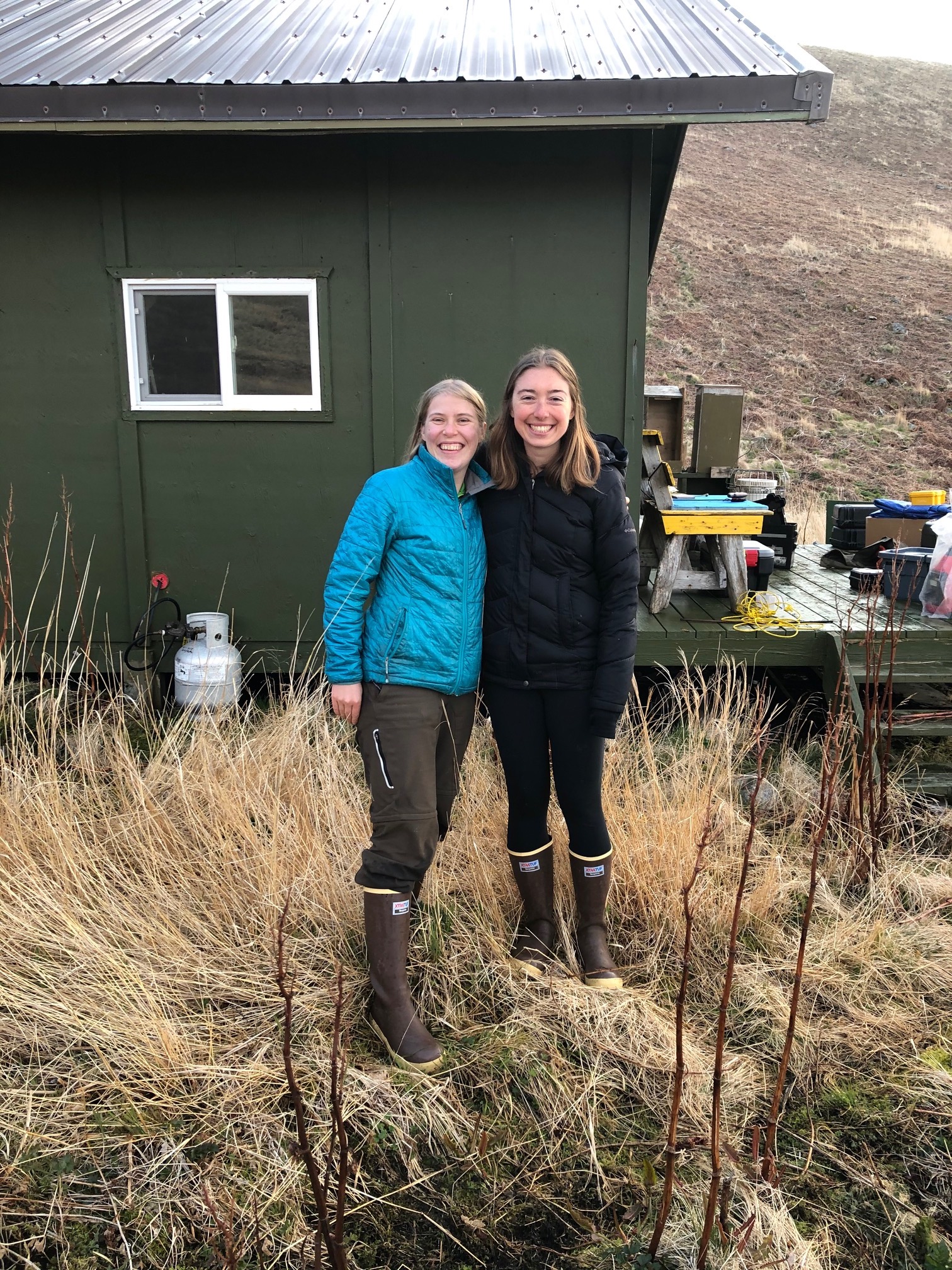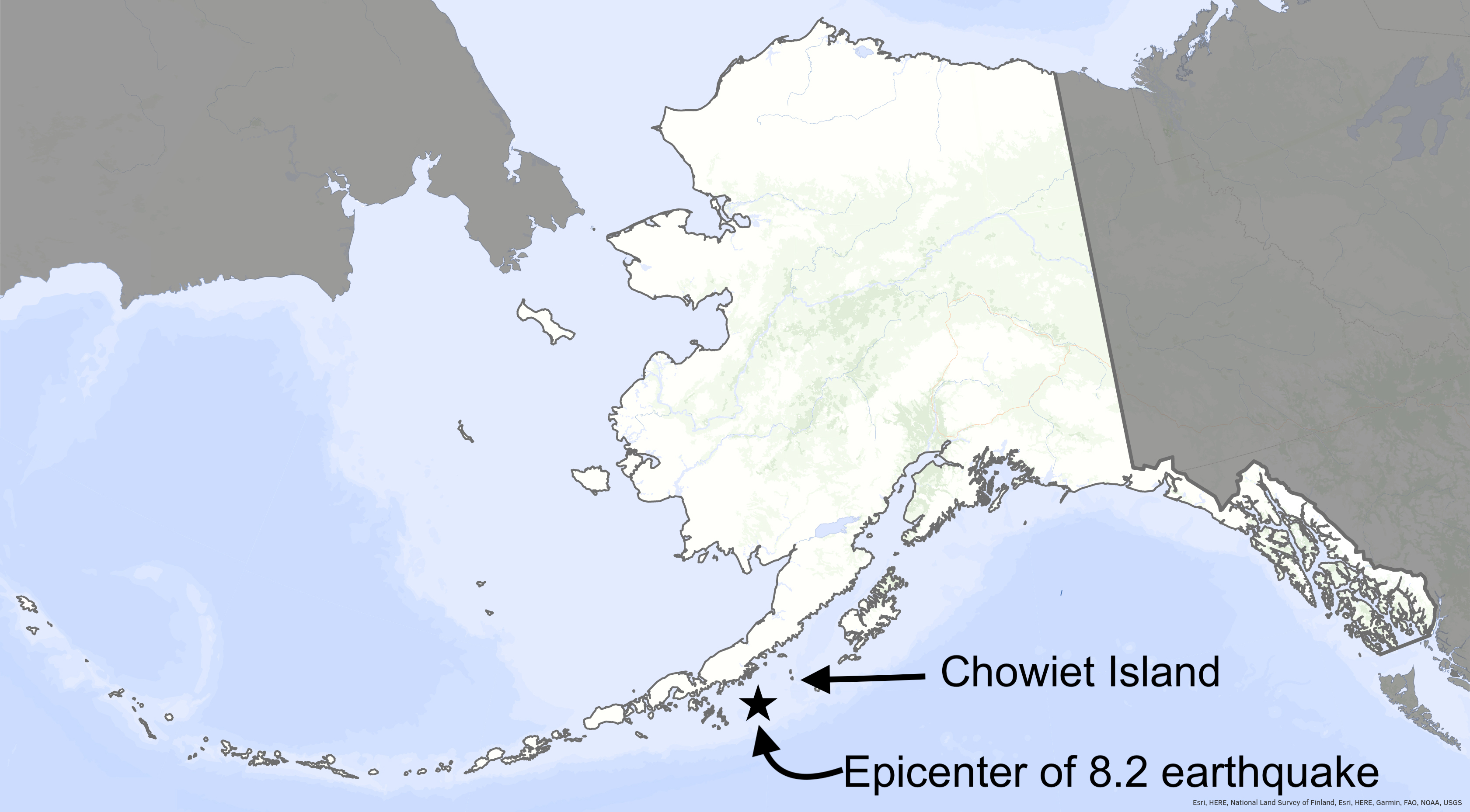

The closest people to an 8.2 earthquake
What if the country’s largest earthquake in the last half century happened as you were getting ready for bed in the only cabin on a tiny island in the North Pacific? What if the epicenter was just 50 miles away?
A magnitude 8.2 earthquake happened at 10:15 p.m. Alaska time on July 28, 2021. The people who were closest to the rupture within the Aleutian megathrust zone were two biologists who are living on Chowiet Island this summer.
Chowiet Island, a tiny speck in the North Pacific, is part of the vast Alaska Maritime National Wildlife Refuge, which includes the entire sweep of the Aleutian Islands.
The crew of the Refuge ship the Tiglax dropped Katie Stoner and Briana Bode off on Chowiet Island in early May. Their duties on the green island are to climb its rocky cliffs and continue studies on murres, auklets and puffins and other seabirds that biologists have carried out for years.
Stoner and Bode live in what they described by satellite email as “a small, rustic cabin with no plumbing, no wiring and only one appliance (a propane stove and oven).”
The cabin sits on marshy flats on the island’s lowlands, about 90 feet above sea level. Except for a brief resupply visit from the refuge ship, Stoner and Bode will see no one else this summer.
Here is their earthquake story, relayed via their satellite email from Heather Renner, supervisory wildlife biologist at the Alaska Maritime National Wildlife Refuge in Homer:
On the evening of July 28th, Stoner had retired to her bunk by 10 p.m. Bode was about to brush her teeth when Stoner asked if Bode had felt an earthquake.
Soon, the shaking intensified. Bode yelled, “Out, out the door!”
Once on the deck, they noticed the cabin swaying. They heard the clatter of stuff falling from shelves.
“Our first thought was ‘that was BIG!’” Stoner said.
Looking out to nearby Kateekuk Island, they saw a mammoth slab of rock separate and fall to the water. Another island, farther away, was surrounded by a halo of dust (they later think the dust they saw and tasted was not from landslides, but from rocks rubbing together due to the exceptional ground motion).
The women estimated the initial shaking, which seemed to go on forever, probably rocked and rolled their island for less than a minute.
The ocean was just 250 yards from the cabin door. They needed to get to higher ground (the tallest peak on the island is 800 feet high) in case a rupture beneath the ocean floor pushed a tsunami their way.
“We didn’t even take the time to tell anyone (via satphone or satellite texter) there had been a quake,” Stoner said. “We knew from the feel that it was big, and close enough that we might not have much time before a wave arrived.”
In between shakes that froze them motionless, they went back into the cabin and grabbed a satellite phone, their shoes, and a computer with all the bird information they have so far gathered this summer. They both shoved energy bars into their packs and then filled their water bottles from their rain-catchment system on the deck.
They also stuffed sleeping bags into their packs and started up a trail behind the cabin. They estimated they were up the hillside within about two minutes from when they first felt the earthquake.
Pausing at about 300 feet above sea level, they used their satellite texter to contact Lisa Spitler, who works for the refuge on the island of Adak, in the middle of the Aleutian Chain a few hundred miles to the west.
Spitler texted them back that the earthquake was indeed a whopper — “8.2! located just 30 nautical miles from us,” and that a tsunami warning was in effect.
Fearing to continue climbing to the ridgetop during aftershocks that were also significant earthquakes, the women stayed on their platform of ferns and bent-over blades of rye grass. They tucked into their sleeping bags and stared at the infinite ocean. The sky darkened.
“Sea lions were calling, peregrine (falcon) fledglings were yowling, and sparrows were going about their nightly routines, unconcerned by the regular aftershocks we were experiencing,” Stoner said.
The women remained on the hillside until about 1 a.m. Then, the light on their satellite texter flashed green. Spitler said researchers at the Pacific Tsunami Warning Center in Palmer had determined that the giant earthquake did not generate a deadly wave; all was clear.
Using a tiny flashlight in what was then the full blackness of night, they crept through ferns and rocks back down to their cabin. Bode headed to the propane tank outside and twisted the valve to shut it off in case the stove might be leaking. Then they pointed the flashlight inside.
“The floor was coated in fallen cans, dishes, and spices, while gear had fallen from the shelves and empty totes fell from the rafters,” Stoner said. “Surprisingly, the only thing broken was the handle to one of our coffee mugs.”
After cleaning up the cabin enough to give them some space and then packing chargers and more clothes into their backpacks in case they had to leave again, the women crawled into their bunks.
The earthquake spawned hundreds of aftershocks — the largest one a 6.1. Bode and Stoner got rocked every half hour, which spiked their adrenal systems.
“We waited anxiously for dawn and tried really, really hard not to think about vibrations,” Stoner wrote. “This was further complicated by wind gusts hitting the cabin and triggering small shakes and larger moments of fear.”
The women are now safe and anxious to check out the earthquake’s effects on the nesting birds they are studying. They have also noticed “a strong scent, like animal decomposition, but do not know the cause yet,” Stoner said.
As “the shivers” die down, Stoner and Bode will continue on with the routines of their research and summer life on their island. The Tiglax is scheduled to pick the biologists up and bring them back to Homer at season’s end, in early September 2021.







